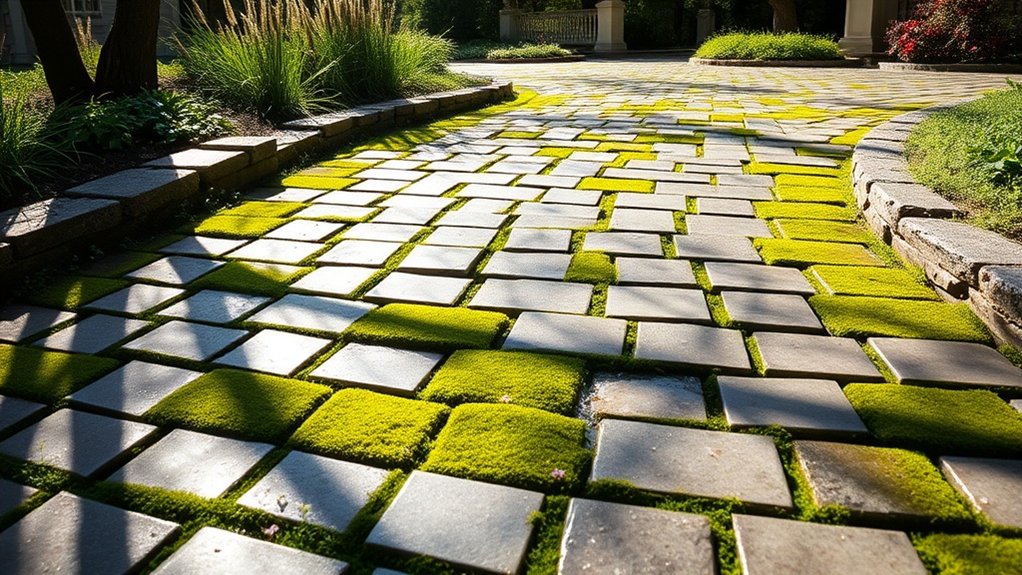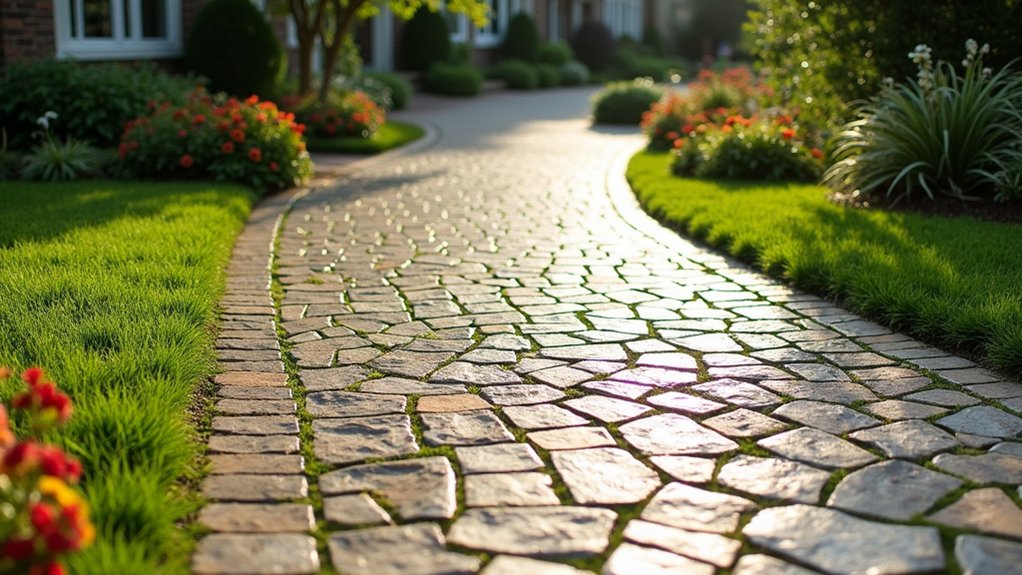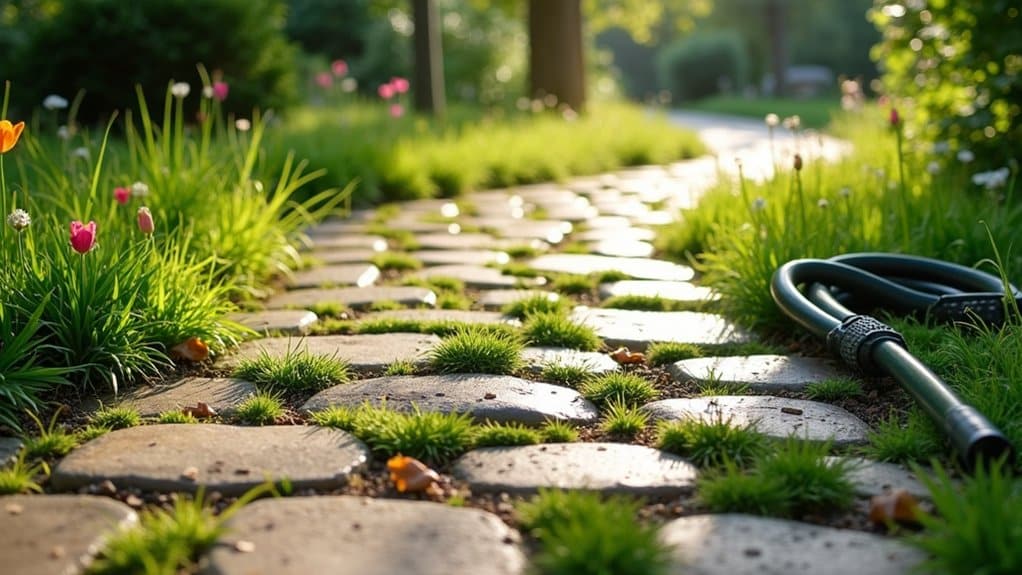Permeable driveways are a smart investment, offering both long-term savings and environmental advantages. They help reduce stormwater runoff, lessen flooding, and can boost your property value, sometimes providing a return of up to 109%. Installation costs typically range from £10 to £30 per square metre, but financial incentives like tax relief and potential rebates can significantly lower these costs. Plus, with proper maintenance, they are built to last. Consider how these benefits can enhance your property and overall investment potential.
Table of Contents
ToggleKey Takeaways
- Permeable driveways help reduce urban flooding and manage stormwater effectively, making them a sustainable choice for the environment.
- While the upfront cost may be higher, ongoing maintenance is generally less expensive, and you might benefit from government rebates and tax incentives.
- Homeowners could see reduced drainage fees with permeable surfaces, adding to the financial advantages over time.
- These driveways can enhance your property’s aesthetic appeal and may increase its value, especially in competitive housing markets.
- With proper installation and care, permeable driveways can last between 20 to 40 years, making them a durable investment.
Financial Investment and Cost Analysis
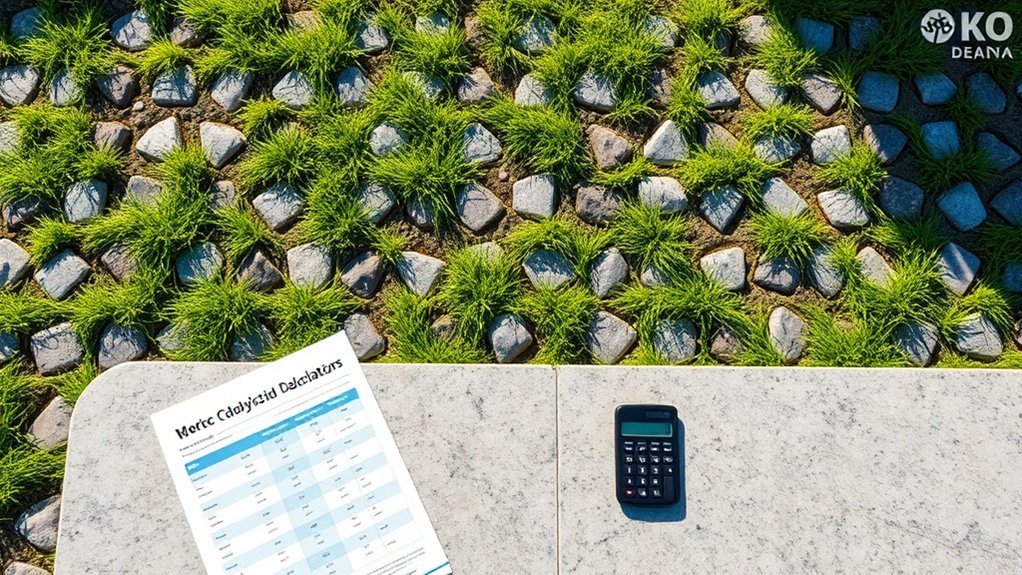
When considering a permeable driveway, it’s important to assess the financial investment and cost implications.
The cost for permeable paver driveways ranges from £10 to £30 per square metre, while porous asphalt is a more economical choice at £7 to £15 per square metre.
For a typical two-car driveway, total project costs can vary, averaging around £12,000 in the UK.
Opting for a DIY installation could save you £2 to £4 per square metre on labour costs, though it does require significant effort. The construction involves a layered design crucial for effective water drainage and optimal performance.
In the long run, the return on investment comes from lower maintenance costs and potentially avoiding stormwater management fees, making permeable driveways a financially sensible option if well-maintained. Additionally, permeable systems can reduce or eliminate stormwater runoff, which contributes to long-term environmental savings.
Environmental and Stormwater Management Advantages
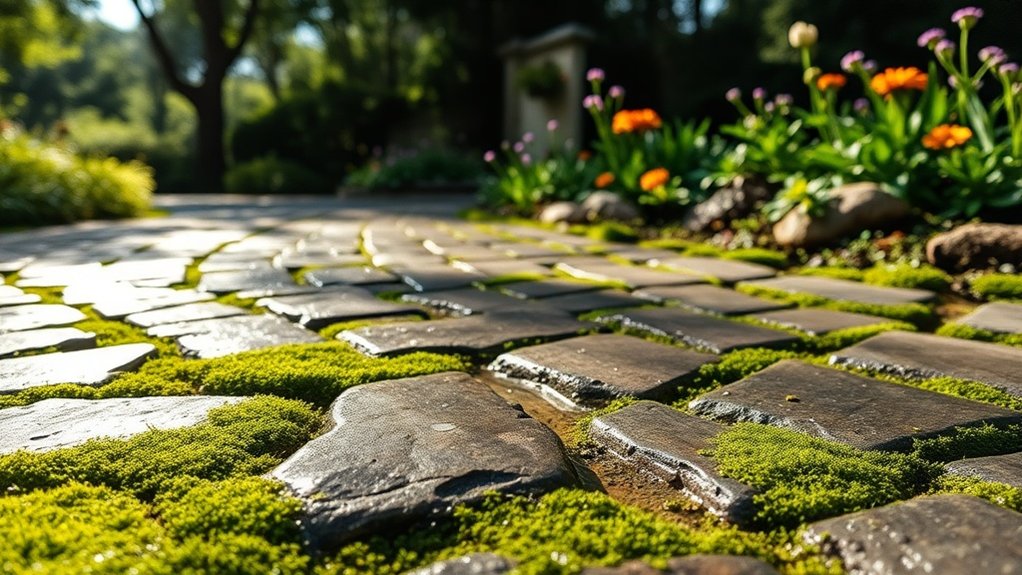
Investing in permeable driveways brings not only financial advantages but also important environmental and stormwater management benefits. These driveways help to reduce urban runoff by allowing water to seep through and replenish groundwater supplies, which is essential for sustainable landscaping. They also help to prevent flooding by lowering surface runoff, reducing the burden on local storm drains. Furthermore, permeable surfaces filter out pollutants, improving water quality and safeguarding aquatic ecosystems. Additionally, stormwater management practices like these significantly contribute to mitigating the urban heat island effect, making urban areas more livable. The use of permeable materials in driveway construction enhances overall drainage efficiency and supports environmental sustainability.
| Advantage | Impact on Environment | Benefits to Homeowners |
|---|---|---|
| Stormwater Runoff Reduction | Prevents flooding | Minimises landscaping damage |
| Groundwater Recharge | Supports water supply | Ensures long-term resource availability |
| Pollutant Filtration | Protects local waterways | Boosts property value |
| Erosion Control | Maintains landscape stability | Reduces maintenance costs |
Durability and Long-Term Maintenance Considerations
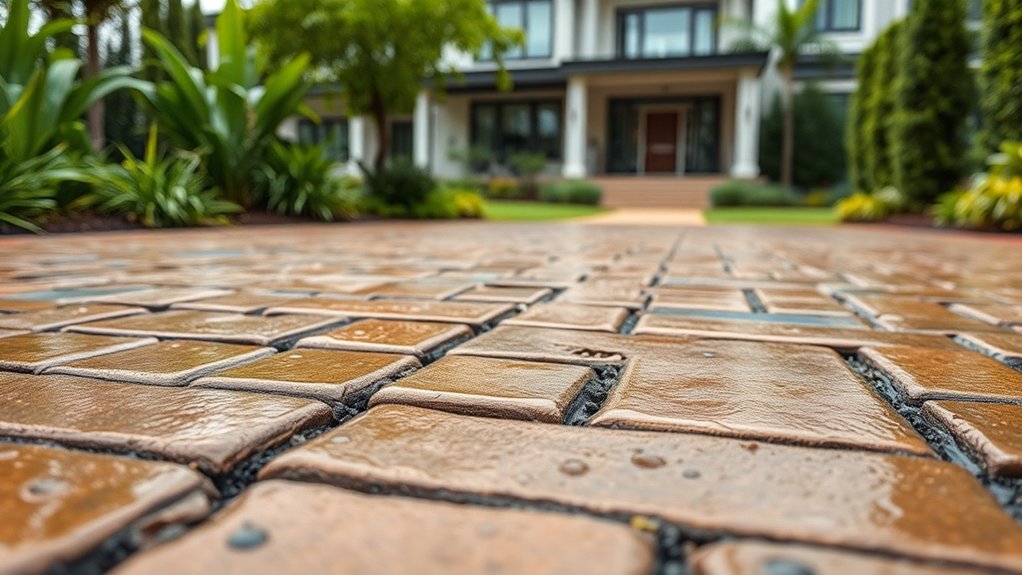
Permeable driveways offer significant environmental advantages, but their durability and maintenance are crucial for homeowners. When installed correctly, these pavements can last between 20 to 40 years, even in challenging weather conditions. To ensure longevity, proactive maintenance is essential. This includes vacuum sweeping at least three times a year to avoid blockages. It’s particularly important to manage fine sediment build-up, especially after winter gritting. While permeable materials handle freeze-thaw cycles better than standard pavements, it’s wise to incorporate overflow structures to effectively manage stormwater. Additionally, proper design and construction are essential to ensure long-term functionality, particularly in porous pavement systems. Regular inspection of SuDS compliance features will also help maintain effective drainage and prolong the lifespan of your driveway. With proper upkeep, the infiltration rates of your permeable driveway will remain adequate, ensuring it serves you well for many years.
Financial Incentives and Potential Savings
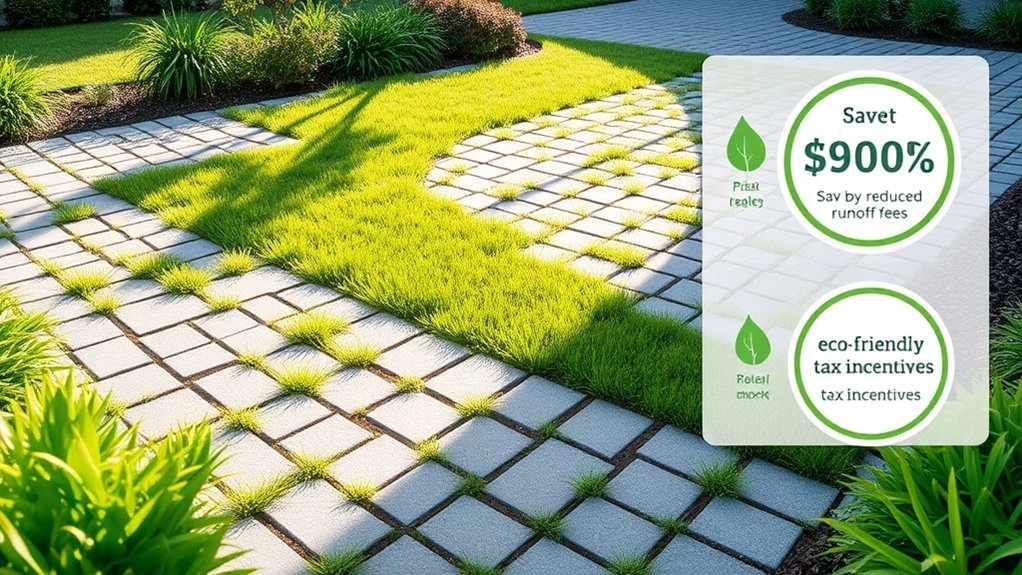
There are many financial incentives for homeowners in the UK considering permeable driveways, making this investment more affordable. Local councils may offer rebates for eco-friendly materials, with some areas providing significant support.
For instance, replacing hard surfaces could earn you a rebate of up to £15 per square metre, depending on your location.
Moreover, properties with permeable surfaces can benefit from reduced drainage fees, leading to savings over time. Tax relief for sustainable infrastructure can also help lower costs.
Impact on Property Value and Marketability
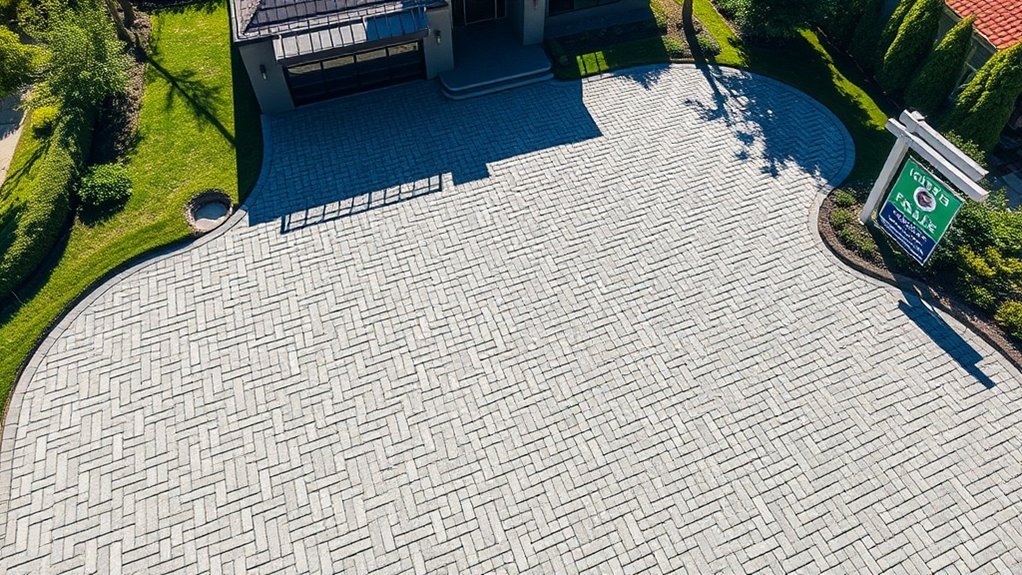
When considering the impact of permeable driveways on property value and marketability, it’s important to note their contribution to curb appeal and first impressions. A well-designed driveway can significantly enhance a property’s attractiveness, especially in comparison to local standards.
Here are some key points to consider:
- Aesthetic Appeal: Permeable driveways enhance the overall look of a property, making it more appealing to potential buyers.
- Return on Investment: In some areas, they can provide a return on investment of up to 109%, particularly where sustainability is valued.
- Market Competitiveness: Unique driveway materials can increase home value in competitive markets, particularly amongst environmentally conscious buyers.
Investing in a permeable driveway not only improves curb appeal but also meets the changing expectations of buyers, potentially boosting marketability and property value.
Installation Complexity and Site Suitability Factors
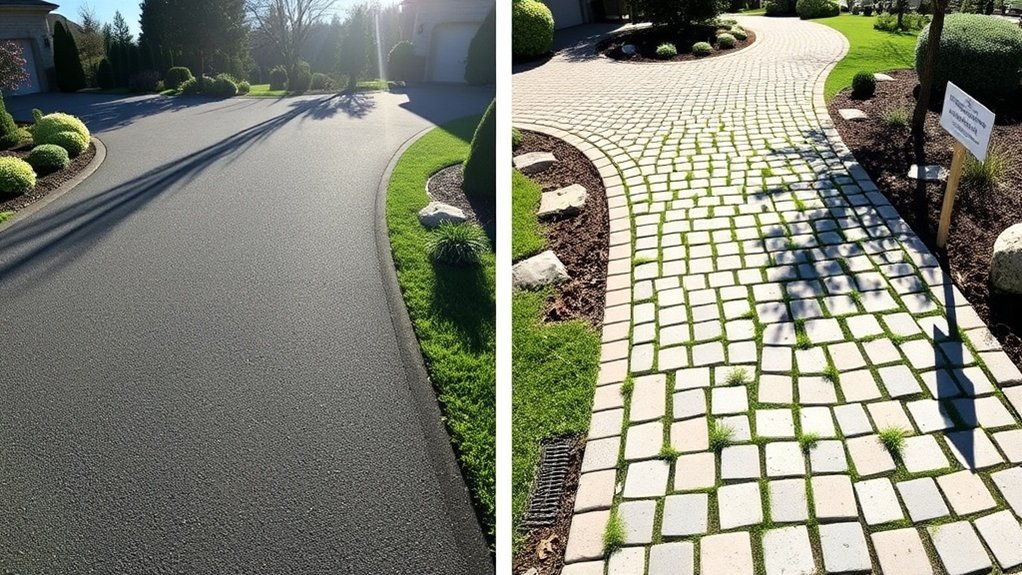
When considering a permeable driveway, it’s crucial to assess the site to ensure it performs well.
The type of soil is important; sandy and loamy soils generally improve drainage, whereas clay may require extra drainage solutions.
Proper management of water runoff is essential to avoid issues during installation.
Site Assessment Requirements
Before installing a permeable driveway, it’s crucial to carry out a comprehensive site assessment to ensure suitability and compliance with local regulations. Here are the key factors to consider:
- Site Evaluation: Assess existing drainage patterns and surface water flow to ensure the system integrates effectively with the surrounding environment.
- Utility Identification: Locate any underground utilities, such as water, gas, and electric lines, to avoid damage during excavation.
- Setback Requirements: Check local building codes for setback regulations from buildings to reduce the risk of basement dampness.
Taking these steps not only ensures compliance with building regulations but also improves the durability and functionality of your permeable driveway, making it a smart choice for your home.
Soil Type Considerations
Understanding soil type is crucial for the successful installation of permeable driveways, as it directly impacts site suitability and installation ease.
Ideal soils, like those in Hydrologic Soil Groups A and B, allow for high infiltration rates, making installations simpler. In contrast, soils classified as C and D have lower infiltration rates, often requiring underdrains and making the process more complex.
For example, clay soils may need deeper sub-bases and additional stabilisation methods due to poor drainage.
It’s essential to carry out soil surveys and infiltration tests to ensure suitability, particularly in areas with weak or expansive soils. A proper assessment ensures effective design and maximises the benefits of permeable driveways.
Drainage System Necessity
Assessing the drainage capacity of a site is crucial when installing permeable driveways. This ensures proper water infiltration and prevents issues like surface pooling.
Here are key factors that affect drainage efficiency:
- Soil Type: If your site has heavy clay or a high water table, you’ll need underdrain systems to manage excess water effectively.
- Site Grading: A gentle slope of 1-2% is important to direct water flow and reduce erosion risks.
- Installation Complexity: Base layers typically require a depth of 15-18 inches, which means you’ll need skilled labour to integrate drainage components properly.
Utilising engineered solutions such as perforated sub-surface pipes or detention reservoirs can enhance performance, particularly in areas with poor natural drainage.
Regular maintenance of these systems is essential to ensure they remain effective and to avoid expensive problems in the future.
Frequently Asked Questions
What Materials Are Used for Permeable Driveway Construction?
For permeable driveways, concrete pavers offer both durability and aesthetic appeal, while gravel serves well for the sub-base. This combination ensures effective water drainage and stability, which are crucial for long-lasting performance.
How Do Permeable Driveways Affect Landscaping and Vegetation?
Permeable driveways improve landscaping and vegetation by enhancing drainage and supporting soil health. They allow water to seep through, which nourishes plants, reduces erosion, and helps maintain steady moisture levels. This creates a thriving garden environment. For example, if you have a permeable driveway, excess rainwater doesn’t just run off; it soaks into the ground, benefiting nearby plants and reducing the need for additional watering.
Are There Aesthetic Options Available for Permeable Driveways?
When it comes to aesthetic options for permeable driveways, there’s a lot to consider. You can choose from various geometric patterns and a range of colours to boost visual appeal while ensuring effective drainage. For example, a herringbone pattern in a warm grey tone can create a contemporary look, while a natural stone finish might blend beautifully with your garden. These choices not only enhance the appearance but also maintain the functionality of your driveway.
What Climate Conditions Are Best for Permeable Driveways?
Permeable driveways work best in wet climates, as they effectively manage rainwater and reduce flooding. In snowy conditions, they help prevent ice build-up, making surfaces safer to walk on. However, their effectiveness can decrease with heavy traffic or in areas with a lot of sediment.
Can Permeable Driveways Support Heavy Vehicles Like Trucks?
Yes, permeable driveways can support heavy vehicles like trucks, provided they are engineered for weight distribution. When installed correctly with robust base materials, they offer stability and durability. This setup ensures that loads are effectively managed, preventing the underlying structure from becoming compacted or degraded over time.
Conclusion
In summary, investing in a permeable driveway can offer notable advantages. For example, studies indicate that permeable surfaces can reduce stormwater runoff by up to 90%, which helps to alleviate flooding and protect local watercourses. Although the initial outlay may be higher than that of traditional driveways, the long-term savings on maintenance and the potential increase in property value make it a wise investment. Considering these factors will help you make a decision that aligns with both your financial and environmental objectives.
Keep reading to discover how permeable driveways manage stormwater and enhance groundwater recharge while transforming your outdoor space.
Discover the secrets to the durability of permeable driveways and essential maintenance tips that could significantly extend their lifespan.
Learn the essential maintenance tips for permeable driveways and discover how neglecting them can lead to costly repairs.

